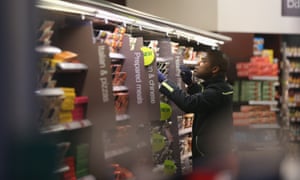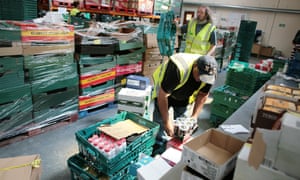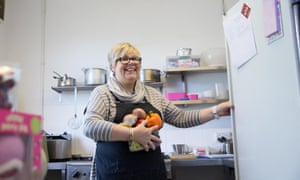M&S moves to hand out thousands of tonnes of food waste
Not
just a food bank … An M&S-filled food bank. Upmarket grocer plans to use
social app to supply local charities with its surplus food and help cut waste

M&S’s food distribution scheme is an extension of the
retailer’s existing relationship with Neighbourly. Photograph: Oli Scarff/Getty
Images
Marks & Spencer is to distribute thousands
of tonnes of surplus food under a scheme that will use a social networking app
to link all 500 of its UK stores to local charities, including food banks.
The retailer, which has committed to cutting
food waste from stores by a fifth by 2020, has been testing different ways of
running the scheme at 45 outlets and opted to work in partnership with the Neighbourly app.
Eighteen months on, it is ready to expand the
scheme nationwide and said it should be up and running by next spring.

“Our
priority is to reduce food waste while ensuring that, where there is a food
surplus, we put it to the best possible use,” said Louise Nicholls, head of
responsible sourcing at M&S.
She said the retailer had already dramatically
cut food waste by in-store measures, such as discounting stock close to its
use-by date earlier in the day, but believed nearly half of the remaining waste
was edible.
At present, M&S sends food waste to
anaerobic digestion energy plants. The process can be costly and means thousands
of tonnes of perfectly edible food never reaches a dinner plate.
In the first stage of the redistribution
scheme, M&S is looking for new charity partners, such as food banks,
community cafes, homelessness groups and community shops to work with 105 more
stores by December. The rest of its UK stores will join the programme by next
spring.
Charities that want to collect free food sign
up to the Neighbourly app with their requirements. Each day M&S stores
register the spare food they have on offer and alert local charities.
Food waste produce to be compostedd Photograph: Alamy
The group’s Cribbs Causeway store in Bristol has
been working with Neighbourly for six months, during which time it has
distributed 4 tonnes of food waste – about 10% of its total – to local
charities including North Bristol food bank and the Upper Horfield Community
Trust. The Trust is home to Daisy’s cafe which provides free meals and
discounted meals for mental health groups and the elderly as it tries to bring
vulnerablepeople together.
Tina Magee, who runs the cafe, said: “We
couldn’t have carried on without M&S. I was funding things myself.” Now she
is able to provide free meals for children once a week by selling low-price
meals to other groups.

Tina Magee of the Horfield Community Trust. Photograph:
Gareth Iwan Jones/Gareth Iwan Jones
The Neighbourly app collates information on
how much is being redistributed, helping M&S identify where waste is
occurring.
Advertisement
Nicholls said: “This gives us visibility to
track exactly what product is going where and to tell a more accurate story
about what is happening with our surplus food. When you make food surplus more
visible then you can reduce it.”
The scheme launches as supermarkets face
rising pressure to reduce waste. Just over 1%, or 200,000 tonnes of food wasted
in the UK comes from stores, according to figures released esrlier this year by
the government-backed Waste Resources
Action Programme (Wrap) . Of the estimated 15m tonnes of food thrown away in
the UK each year, more than half is disposed of in people’s homes.
In June, Labour MP Diane Abbott tabled an early-day
motion calling on the government to introduce legislation that would ban
supermarkets from throwing away food that is approaching its best-before date
and instead make it available to charities.
The idea was prompted by the introduction of
similar legislation in France, which now bans large supermarkets from throwing away food
in favour of handing it to charities or for animal feed.
FareShare takes food from supermarkets and distribute it
to charities. Photograph: Martin Godwin for the Guardian
In June, Tesco started a similar scheme in
partnership with food redistribution charity FareShare, which could hand tens
of thousands of tonnes of surplus food from its stores to local charities.
Until recently, only Sainsbury’s operated a nationwide scheme to distribute
food left over in stores to charities. About 300 of its 1,200 stores are
involved.
M&S’s food distribution scheme is an
extension of the retailer’s existing relationship with Neighbourly which it
uses to connect store staff with local charities for volunteering or
fundraising.
Starbucks, Wagamama and Wessex Water also work
with the Bristol-based company, which launched last year. But M&S is the
first to donate food waste via the service which aims to connect
socially-conscious companies with local good causes. It is free to use for
charities but charges its business partners, including M&S, a subscription
fee.
Nicholls said building local relationships
could all be complementary. “It is another way to build a connection. It may be
in time that charities get less food but they get more volunteering.” She said
M&S opted to work with Neighbourly because the trials had shown shops
needed to work with a wide variety of charitable groups based close by.
M&S tried a similar redistribution scheme
about seven years ago, but it never took off due to the complicated and time
consuming nature of the paperwork required to establish the credentials of
charities. Under the new scheme, Neighbourly handles that side of things
centrally.
“Now it is a really simple process for
stores,” Nicholls said.

No comments:
Post a Comment